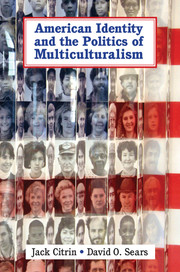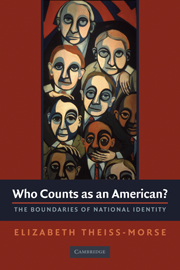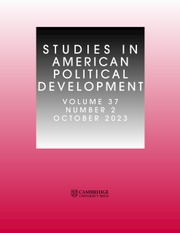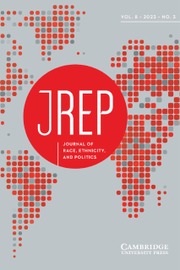American Identity and the Politics of Multiculturalism
$39.99 (G)
Part of Cambridge Studies in Public Opinion and Political Psychology
- Authors:
- Jack Citrin, University of California, Berkeley
- David O. Sears, University of California, Los Angeles
- Date Published: August 2014
- availability: Available
- format: Paperback
- isbn: 9780521535786
$
39.99
(G)
Paperback
Other available formats:
Hardback, eBook
Looking for an examination copy?
If you are interested in the title for your course we can consider offering an examination copy. To register your interest please contact [email protected] providing details of the course you are teaching.
-
The civil rights movement and immigration reform transformed American politics in the mid-1960s. Demographic diversity and identity politics raised the challenge of e pluribus unum anew, and multiculturalism emerged as a new ideological response to this dilemma. This book uses national public opinion data and public opinion data from Los Angeles to compare ethnic differences in patriotism and ethnic identity and ethnic differences in support for multicultural norms and group-conscious policies. The authors find evidence of strong patriotism among all groups and the classic pattern of assimilation among the new wave of immigrants. They argue that there is a consensus in rejecting harder forms of multiculturalism that insist on group rights but also a widespread acceptance of softer forms that are tolerant of cultural differences and do not challenge norms, such as by insisting on the primacy of English. There is little evidence of a link between strong group consciousness and a lack of patriotism, even in the most disadvantaged minority groups. The authors conclude that the United States is not breaking apart due to the new ethnic diversity.
Read more- Combines a historical review of American national identity with a review of current public opinion data on coping with ethnic diversity
- Offers a design that permits the comparison of minority groups and immigrants at different stages of integration
- The first book to seriously look at public opinion about multiculturalism, an ideology with wide support among political and academic elites
Reviews & endorsements
"With each new wave of immigrants, the United States must assess whether social cohesion and national identity continue to thrive. In a thoughtful, empirically rich assessment of racial and ethnic group attitudes in the early twenty-first century, Citrin and Sears offer a confident assessment that immigration, diversity, and a growing national respect for multicultural values do not undermine a strong attachment to the nation."
Louis DeSipio, University of California, IrvineSee more reviews"Two of our most eminent scholars of American racial and ethnic relations now provide us with a fascinating and deeply important study of the ways in which new Americans are, and are not, coming to resemble longer-term Americans. The analysis is careful, nuanced, empirically rich, and - perhaps to the chagrin of many students of race and ethnicity - largely optimistic. New Americans are both patriotic and attached to their group and their culture; there need be no contradiction between identity and incorporation. Citrin and Sears offer appropriate cautions and warnings, but their overall message is a much-needed and well-founded endorsement of Americans’ capacity for stable renewal."
Jennifer Hochschild, Harvard University"This is a book worth waiting for, a rare mix of theoretical guidance and respect for facts. It has it all: what Americans think about America, about who they are, and about each other. The tone is positive but with nuance: the promise of American life is real for newcomers, but immigration and culture polarize white Americans and the biggest divide is still between black and white."
Richard Johnston, The University of British Columbia, Vancouver"This important analysis of the effects of ethnoracial diversity on American identity draws two major conclusions: first, immigration is not leading to weakening national attachment, and second, African Americans continue to be distinctive on several measures, setting them off not only from whites but from Asian Americans and Latinos as well. Citrin and Sears break new ground with their emphasis on psychological dispositions toward national unity, but their conclusions place them well within a growing body of scholarship … Summing up: recommended."
A. L. Aoki, ChoiceCustomer reviews
Not yet reviewed
Be the first to review
Review was not posted due to profanity
×Product details
- Date Published: August 2014
- format: Paperback
- isbn: 9780521535786
- length: 352 pages
- dimensions: 228 x 153 x 18 mm
- weight: 0.48kg
- contains: 4 b/w illus. 43 tables
- availability: Available
Table of Contents
Prologue
1. The challenge of e pluribus unum
2. The political psychology of identity choice
3. Contours of American national identity
4. The ethnic cauldron and group consciousness
5. Public opinion and multiculturalism's guiding norms
6. Do ethnic identities and multiculturalism collide with national identities?
7. Multicultural policies: ethnic consensus and cleavage
8. The dynamics of multicultural-policy preferences
9. Multiculturalism and party politics
10. Conclusion.
Sorry, this resource is locked
Please register or sign in to request access. If you are having problems accessing these resources please email [email protected]
Register Sign in» Proceed
You are now leaving the Cambridge University Press website. Your eBook purchase and download will be completed by our partner www.ebooks.com. Please see the permission section of the www.ebooks.com catalogue page for details of the print & copy limits on our eBooks.
Continue ×Are you sure you want to delete your account?
This cannot be undone.
Thank you for your feedback which will help us improve our service.
If you requested a response, we will make sure to get back to you shortly.
×







